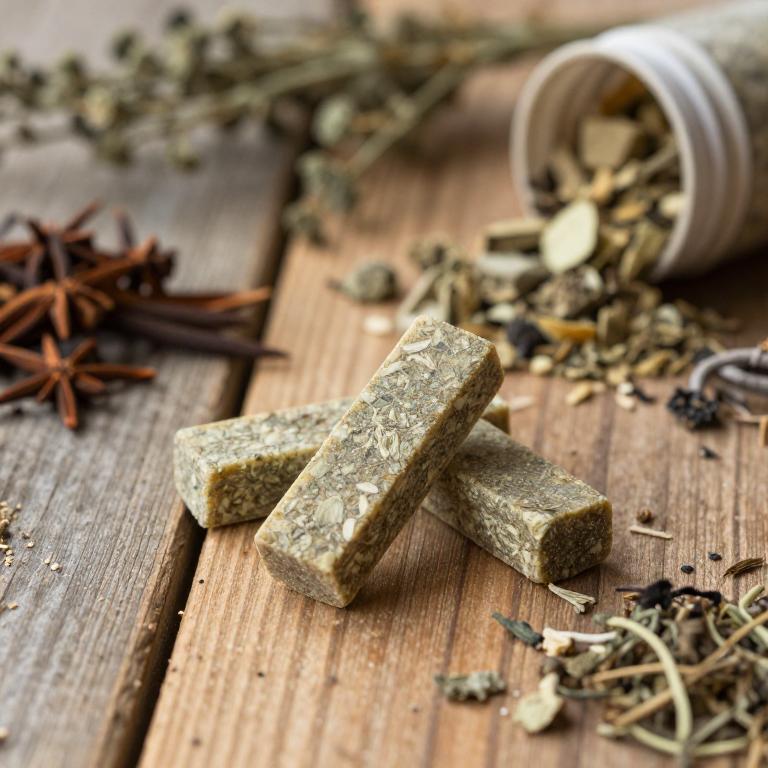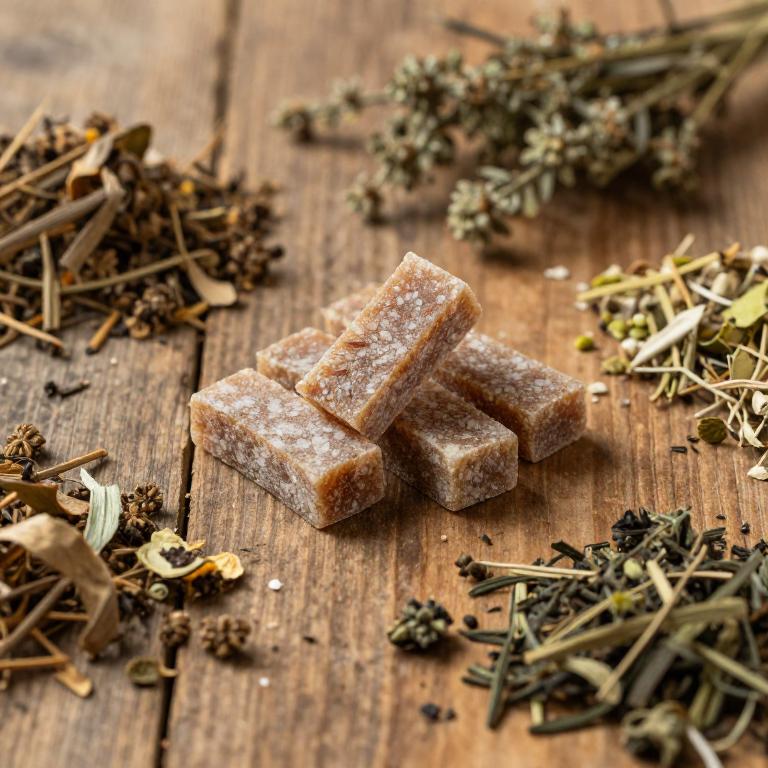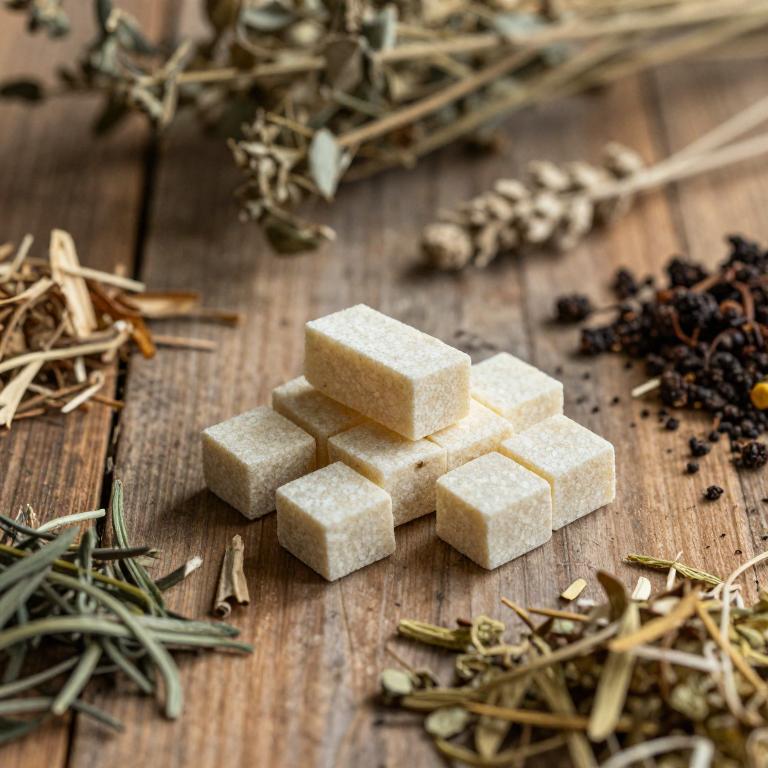10 Best Herbal Lozenges For Laryngitis

Herbal lozenges are commonly used to alleviate symptoms of laryngitis, which is inflammation of the larynx often caused by infection or irritation.
These lozenges typically contain natural ingredients such as echinacea, licorice root, and sage, which are known for their anti-inflammatory and soothing properties. They help reduce throat pain, suppress coughing, and promote healing by creating a protective barrier over the irritated tissues. Many herbal lozenges are free from artificial additives, making them a preferred choice for individuals seeking natural remedies.
However, it is advisable to consult a healthcare provider before using herbal lozenges, especially for prolonged symptoms or in combination with other medications.
Table of Contents
- 1. Ginger (Zingiber officinale)
- 2. Thyme (Thymus vulgaris)
- 3. Salvia (Salvia officinalis)
- 4. Licorice (Glycyrrhiza glabra)
- 5. Fennel (Foeniculum vulgare)
- 6. Ceylon cinnamon (Cinnamomum zeylanicum)
- 7. Black elderberry (Sambucus nigra)
- 8. Chamomile (Matricaria chamomilla)
- 9. Peppermint (Mentha piperita)
- 10. Rosemary (Rosmarinus officinalis)
1. Ginger (Zingiber officinale)

Zingiber officinale, commonly known as ginger, has been traditionally used for its anti-inflammatory and soothing properties, making it a popular ingredient in herbal lozenges for laryngitis.
These lozenges work by reducing inflammation in the throat and alleviating symptoms such as soreness and hoarseness associated with laryngitis. The active compounds in ginger, including gingerol and shogaol, help to combat oxidative stress and provide a warming effect that can ease discomfort. When used as a complementary therapy, ginger lozenges may support the body's natural healing process and reduce the duration of laryngitis.
However, individuals with gastrointestinal issues or allergies should consult a healthcare provider before using ginger-based remedies.
2. Thyme (Thymus vulgaris)

Thymus vulgaris herbal lozenges are formulated with thyme, a herb known for its potent antimicrobial and anti-inflammatory properties, making them a natural remedy for laryngitis.
These lozenges help to soothe irritated throat tissues and reduce inflammation, which is common in cases of laryngitis. The active compounds in thyme, such as thymol and carvacrol, work to combat viral and bacterial infections that often contribute to laryngitis. By providing a local anesthetic effect, the lozenges can also alleviate pain and discomfort associated with a sore throat.
They are generally considered safe for adults and children, though it is advisable to consult a healthcare professional before use, especially for those with known allergies or underlying health conditions.
3. Salvia (Salvia officinalis)

Salvia officinalis, commonly known as sage, has been traditionally used for its soothing and antimicrobial properties, making it a popular ingredient in herbal lozenges for laryngitis.
These lozenges are designed to provide relief from the inflammation and irritation associated with laryngitis by reducing mucus production and calming the throat. The essential oils in sage, such as thujone and camphor, contribute to their expectorant and antiseptic effects, helping to ease coughing and promote healing. While generally considered safe, it is important to consult a healthcare professional before use, especially for individuals with allergies or those taking medications.
Overall, sage herbal lozenges offer a natural alternative for managing symptoms of laryngitis, supporting respiratory comfort and recovery.
4. Licorice (Glycyrrhiza glabra)

Glycyrrhiza glabra, commonly known as licorice root, is widely used in herbal medicine for its soothing and anti-inflammatory properties.
Glycyrrhiza glabra herbal lozenges are formulated to alleviate symptoms of laryngitis by reducing throat irritation and inflammation. The active compounds in licorice root, such as glycyrrhizin and flavonoids, help to suppress coughing and ease soreness in the throat. These lozenges are often preferred as a natural alternative to conventional cough suppressants, offering a gentler approach to symptom management.
However, long-term use should be monitored due to potential side effects associated with high doses of glycyrrhizin.
5. Fennel (Foeniculum vulgare)

Foeniculum vulgare, commonly known as fennel, is often used in herbal lozenges to alleviate symptoms of laryngitis due to its anti-inflammatory and antiseptic properties.
These lozenges help soothe irritated throats and reduce inflammation in the larynx, making them a popular natural remedy for soreness and discomfort. The essential oils in fennel, particularly anethole, have been shown to ease coughing and promote easier breathing by relaxing the airway muscles. Herbal lozenges containing foeniculum vulgare are typically safe for most adults and can be used as a complementary therapy alongside conventional treatments.
However, it is advisable to consult a healthcare professional before using them, especially for individuals with allergies or existing medical conditions.
6. Ceylon cinnamon (Cinnamomum zeylanicum)

Cinnamomum zeylanicum, commonly known as cinnamon, is often used in herbal lozenges to alleviate symptoms of laryngitis due to its antimicrobial and anti-inflammatory properties.
These lozenges work by soothing the irritated throat and reducing inflammation in the larynx, which can help ease discomfort and promote healing. The essential oils in cinnamon have been shown to inhibit the growth of bacteria and viruses that may contribute to throat infections. When used as a complementary therapy, cinnamon lozenges can provide natural relief without the side effects of conventional medications.
However, it is advisable to consult a healthcare professional before using them, especially for prolonged or severe cases of laryngitis.
7. Black elderberry (Sambucus nigra)

Sambucus nigra, commonly known as elderberry, is often used in herbal lozenges to support the treatment of laryngitis due to its anti-inflammatory and antioxidant properties.
These lozenges may help reduce throat irritation and swelling, providing relief from the discomfort associated with laryngitis. The natural compounds in elderberry, such as flavonoids and vitamin C, are believed to enhance the immune system and potentially shorten the duration of respiratory infections. While they are not a substitute for medical treatment, they can be a complementary remedy for mild cases of laryngitis.
As with any herbal supplement, it is advisable to consult a healthcare provider before use, especially for individuals with existing health conditions or those taking other medications.
8. Chamomile (Matricaria chamomilla)

Matricaria chamomilla, commonly known as German chamomile, is a herbal remedy often used to soothe throat irritation and reduce inflammation.
Chamomilla herbal lozenges are formulated to provide localized relief for symptoms of laryngitis, such as sore throat and hoarseness. These lozenges contain the active compound bisabolol, which has anti-inflammatory and antimicrobial properties. The soothing effect of chamomile helps to calm the irritated mucous membranes in the throat.
When used as part of a holistic approach, chamomilla lozenges may support faster recovery from laryngitis by reducing discomfort and promoting healing.
9. Peppermint (Mentha piperita)

Mentha piperita, commonly known as peppermint, is a popular herbal ingredient used in lozenges for the relief of laryngitis.
These lozenges work by providing a cooling sensation that soothes irritated throat tissues and reduces inflammation. The menthol in peppermint has mild anesthetic properties that can temporarily numb the throat, easing pain and discomfort. Additionally, the aromatic compounds in peppermint may help clear nasal passages and improve breathing, which is beneficial for those with laryngitis.
While not a cure, peppermint lozenges can be a natural and effective complementary treatment for symptom relief during mild to moderate throat infections.
10. Rosemary (Rosmarinus officinalis)

Rosmarinus officinalis, commonly known as rosemary, is a herbal remedy that has been traditionally used for its anti-inflammatory and antimicrobial properties.
Rosemary herbal lozenges are formulated to soothe irritated throats and reduce inflammation associated with laryngitis. These lozenges often contain essential oils such as camphor and eucalyptus, which help to ease coughing and improve respiratory comfort. The natural compounds in rosemary may also support the body's healing process by promoting circulation and reducing mucus buildup.
When used as part of a holistic approach, rosemary lozenges can offer a gentle and effective alternative for managing symptoms of laryngitis.